Mark 12:28-34 is the Gospel reading in the Revised Common Lectionary for Nov. 3, just two days before the Election. Here are sermon ideas using Gentle, Invitational, and Robust approaches. Love your neighbor: vote!
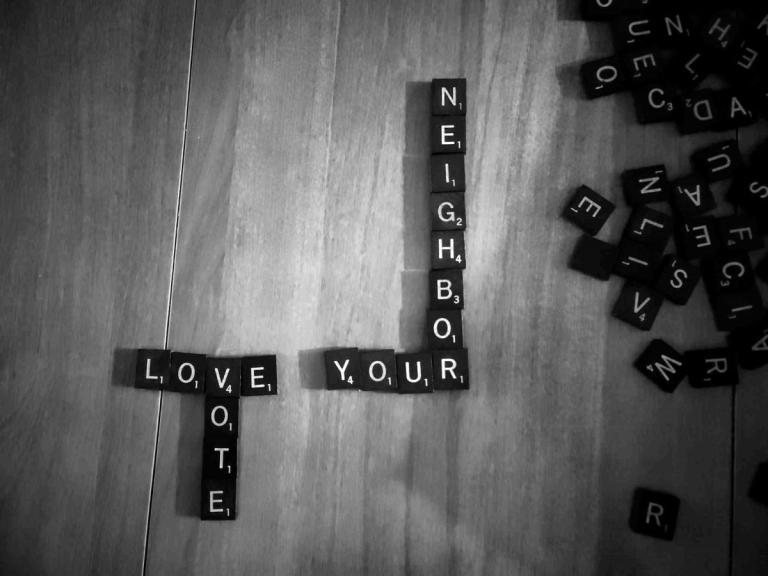
Preaching about the election on Nov. 3?
[If you’re preaching instead on John 11:32-44 for All Saints Sunday instead, see this article: https://www.patheos.com/blogs/ecopreacher/2024/10/voting-elections-all-saints-sunday-preaching-john-11/.]
Before we examine Mark 12:28-34 and how it might address themes for the Sunday before the election, I want to explain that preachers can address issues related to the election.
Preachers are free to discuss the themes and issues relevant to an election – as long as they refrain from endorsing specific candidates. In fact, many congregants appreciate when their ministers offer biblical, theological, and ethical insight on social issues that impact their lives, families, and communities.
In this article, I explained the do’s and don’ts of what clergy and congregations can say and actions they can take when it comes to politics.
Keep in mind that the biblical writers spoke to the social and political issues of their time because God is concerned with the well-being of all people.
This means that it’s not only permissible for preachers to discuss the election, but it is also their moral and ethical duty to relate the Bible and theology to the issues that are relevant today, particularly as people prepare to exercise their right to vote.
But HOW a preacher talks about the election in their sermon also matters.
I developed an Assessment Tool for preaching and social issues which you can take here. This 5-minute online tool will help you think about your approaches to preaching and social issues using a three-dimensional questionnaire that measures: (1) your own vulnerabilities and strengths, (2) the characteristics of the congregation you serve, and (3) the quality of relationships within the congregation and between the congregation and yourself.
Gentle, Invitational, and Robust Approaches
Based on your score from the Assessment Tool, you’ll see that I suggest three approaches to a sermon addressing a social issue: Gentle, Invitational, and Robust. This is a framework I developed for my book Preaching and Social Issues: Tools and Tactics for Empowering Your Prophetic Voice to help ministers choose which path works best for them and their context.
- The Gentle approach is for clergy who are in situations where there may be personal or congregational stress, the congregation is new to sermons addressing social issues, or there is vulnerability on the part of the preacher.
- The Invitational approach is recommended for congregations that are ready for a more challenging message by way of dialogue and building bridges of listening, empathy, and understanding.
- The Robust approach is for clergy and congregations who are ready to be fully engaged in public theology and to put their faith into action on social issues.
I suggest three strategies for each, for a total of nine in all. You can read about these approaches in more detail in my book. In the meantime, here’s a graphic with a quick summary:
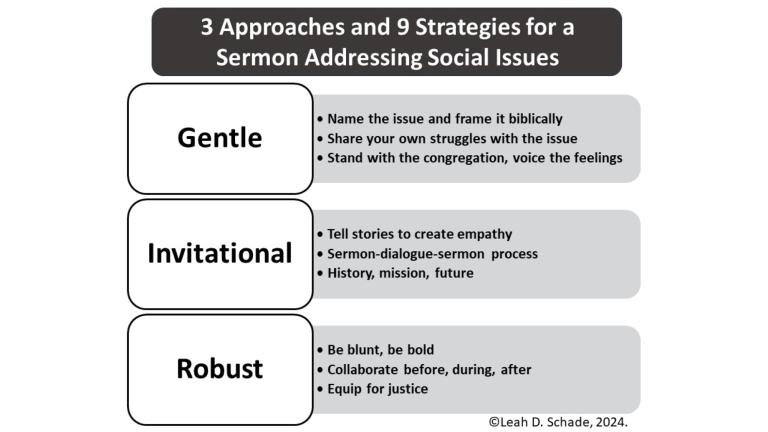
For this installment on preaching during the election season, we’ll look at Mark 12:28-34. I’ll begin with a brief exegetical summary of the passage and suggest connections to election issues. Then I’ll offer Gentle, Invitational, and Robust sermon ideas that you can use in your preaching context.
Nov. 3, 2024: Twenty-fourth Sunday after Pentecost: Mark 12:28-34
Exegetical summary
In this passage in the Gospel of Mark, a scribe comes upon Jesus and the religious leaders engaged in a heated argument. They tried to trap Jesus (12:13-17) and engage him in nonsensical disputes (12:18-27). So the scribe cuts to the chase with a question about the greatest commandment. Jesus directly quotes Deut. 6:4 as well as Leviticus 19:18: love God and love your neighbor.
The scribe affirms Jesus’s answer and adds that following those commandments are “much more important than all whole burnt offerings and sacrifices” (12:33). In response, Jesus says that the man is “not far from the kingdom of God” (12:34).
Why did Jesus consider the scribe’s answer to be wise? And what does this imply for the ethics of voting in the 2024 election? Love your neighbor: vote!
Connections to election issues
One of the primary purposes of burnt offerings and sacrifices was to atone for sin. But if one’s intention is to be in right relationship with God and neighbor from the start, there would be little need for offerings and sacrifices. As the saying goes, an ounce of prevention is worth a pound of cure. This is why the scribe says that following the commands to love God and love your neighbor is “more important” than the performing the sacrifices for breaking those commands.
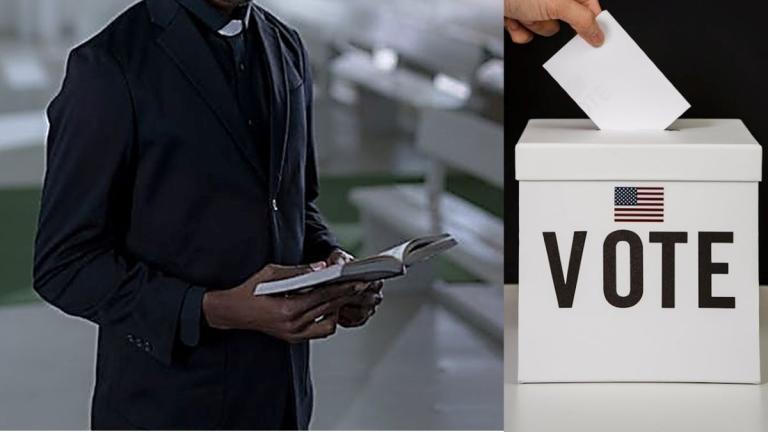
There is a natural application of this passage to the 2024 election. If our votes were guided by an ethic of being in right relationship with God and neighbor from the start, there would be much less need to clean up the mess of our collective sin afterward.
For example, the effort put into voting for candidates who align with an ethic of care is much less than the effort to recover from leaders who intentionally inflict harm upon their nation’s citizens.
And the effort expended for engaging in a peaceful election process that ensures all voices are heard is much less than the effort of dealing with the fallout of political violence.
Thus, loving your neighbor and loving God requires voting for candidates whose policies support an ethic of care and fairness. Love your neighbor: vote!
Gentle approach: Share your own struggles with the issue.
The preacher can begin by acknowledging that they are feeling tension around the debate about the role of the church in this tense political time. Some would rather the preacher say nothing about public issues. Others are longing for the preacher to say something to help them make sense of the convoluted issues we are facing, and to bring a biblical and theological lens to that conversation.
It follows, then, that a sermon on this Sunday can explore what kind of church we shall be, knowing what the Bible models for us, and knowing what challenges our community is facing.
In what ways does your congregation demonstrate love for both God and neighbor through care of Creation, your neighbors, and the larger society? What ministries of advocacy and action help you love your neighbor?
As Christians, it is not just acceptable, but necessary to ask ourselves how our votes can enact our love for God and neighbor. Love your neighbor: vote!
Invitational approach: Tell stories to create empathy.
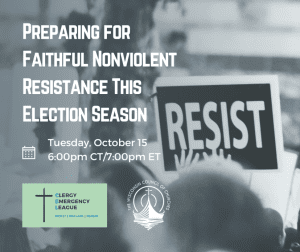
In this sermon, the preacher can share stories about people of faith ministering to those who have been hurt by the rise of Christian nationalism that is targeting vulnerable people. What congregations are coming alongside trans teens to give them support and courage? What churches are advocating for immigrants and refugees? Who are the religious leaders that are publicly calling for nonviolent resistance to evil?
[Watch this informative webinar, “Preparing for Faithful Nonviolent Resistance This Election Season,” with Rev. Lauren Grubaugh Thomas, hosted by The Clergy Emergency League and Wisconsin Council of churches.]
With these examples of “loving your neighbor” in mind, the preacher can pose a question. As Christians, as a community of faith, what is our “best self” that could emerge during this difficult time? Do we have the courage to go to stand with Jesus in the public square and face what needs to be faced? Can we have the tough conversations, just as Jesus did?
On this Sunday just two days before the election, this prophetic courage is part of what it means to be a follower of Jesus. Love your neighbor: vote!
Robust approach: Equip for justice.
For this sermon, the preacher can pose the question: What is the story of Jesus in the public debate with the religious leaders teaching us about what it means to be the church in the midst of contentious public issues?
Jesus does not back down from those who want to silence him or ensnare him in meaningless arguments. He brings Scripture and God’s commandments to bear on these public discussions. God’s word speaks for itself.
What’s interesting about this passage is that this is one of the few times that a religious leader is shown to support Jesus and side with him against his bad-faith comrades. It takes courage to stand up to one’s peers when they are doing wrong and side with the one under attack. But this scribe essentially shuts down the “trolls” and refocuses his peers on what’s actually important – loving God and neighbor.
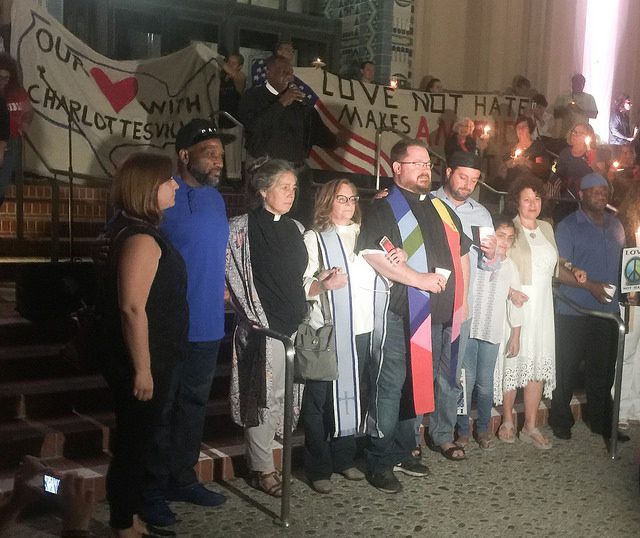
Thus, this exchange can be instructive when we are confronting Christian nationalists and others who distort the word of God or try to distract us with meaningless quarrels. The two greatest commandments are clear: Love God and love neighbor. When we orient ourselves on those principles and stand firm on their prophetic ground, we may find that we have unexpected allies who decide to stand together with us so that we are not alone.
Love your neighbor: vote!
Bottom line – people of faith must overwhelm the ballot box with goodness, solidarity, and love.
The story of Jesus confronting the religious leaders shows us that like Jesus, we need to bring our whole selves to the public square. This means bringing our intellect, our emotions, our actions, and, yes, our faith and values to the ballot box on Election Day.
No matter the outcome of the midterm elections, the work remains. Our neighbor is still in need waiting for us to follow the command to have compassion for them.
It’s time to make our way to the public places with Jesus and to stand alongside the courageous scribe on these matters of life and death. It’s time to bring our whole selves to this democracy, to this country, to this public discourse about what kind of people we will be.
Jesus brought it all when he engaged with the leaders.
Are you ready to bring it all?
Are you ready to bring your whole self? To bring your faith and values to the ballot box?
When we stand on the commandment to love God and love neighbor, our votes, our actions, and our ministry will fulfill the ethical law of God. Love your neighbor: vote!
May God bless your discernment, dialogue, preaching, and ministry during this election season!
Stay tuned for sermon helps for the post-election season!
Read also:
Voting, Elections, All Saints Sunday: Preaching John 11
What Clergy Can Say (and Not Say) During the Election Season
Ideas for Clergy Dealing with Pre-Election Stress
Fill Your Lamps, Church – Let’s Be Ready! Post-election Sermon

The Rev. Dr. Leah D. Schade is the Associate Professor of Preaching and Worship at Lexington Theological Seminary in Kentucky and ordained in the ELCA. Dr. Schade does not speak for LTS or the ELCA; her opinions are her own. She is the author of Preaching and Social Issues: Tools and Tactics for Empowering Your Prophetic Voice (Rowman & Littlefield, 2024), Preaching in the Purple Zone: Ministry in the Red-Blue Divide (Rowman & Littlefield, 2019) and Creation-Crisis Preaching: Ecology, Theology, and the Pulpit (Chalice Press, 2015). She is the co-editor of Rooted and Rising: Voices of Courage in a Time of Climate Crisis (Rowman & Littlefield, 2019). Her book, Introduction to Preaching: Scripture, Theology, and Sermon Preparation, was co-authored with Jerry L. Sumney and Emily Askew (Rowman & Littlefield, 2023).













